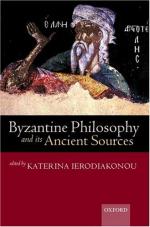|
This section contains 6,590 words (approx. 22 pages at 300 words per page) |

|
"Medieval philosophy" began with the African Christian Augustine of Hippo (354–430), whose life and writings reflected the unsettled state of the declining Roman Empire long before the commencement of the Middle Ages proper. His rich and many-sided works display the Platonic otherworldliness of his theories of knowledge and world history. According to Augustine's vision, the true cosmic plan unfolds in the history of the City of God, and the local accidents of the Earthly City are of little account in comparison. Correspondingly, true wisdom and virtue are obtainable only in the light of the Christian faith and by the prevenience of divine grace; human nature, grossly corrupted since the Fall, is in need of a correspondingly complete divine remaking. Whereas for Plato and Aristotle the fulfillment of human capacities required the possession of a high degree of sophisticated intelligence, for Augustine such fulfillment depended on rightness of...
|
This section contains 6,590 words (approx. 22 pages at 300 words per page) |

|


